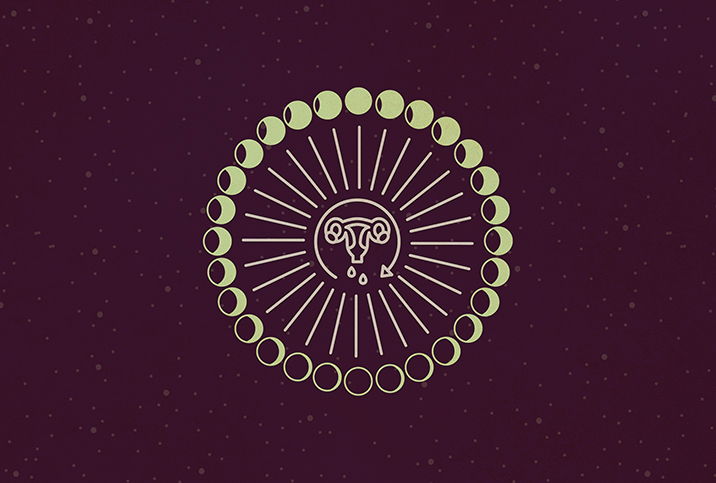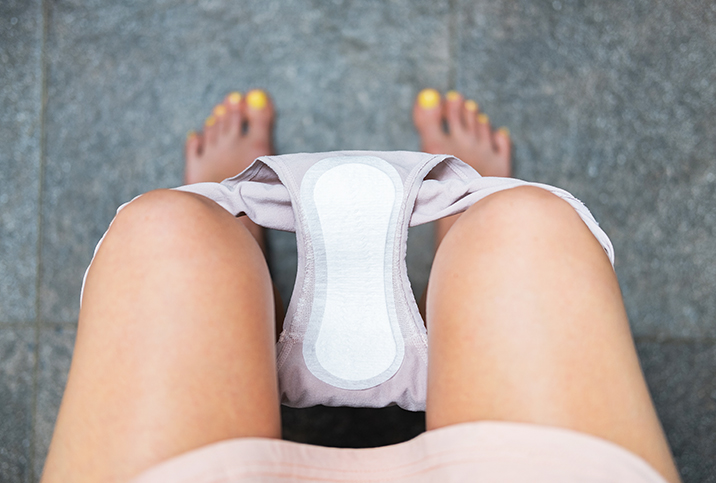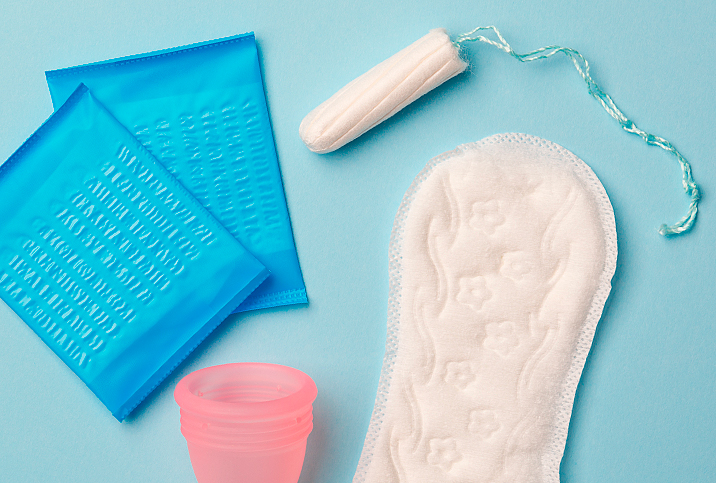Your Menstrual Cycle Is Not in Sync With the Moon

According to one theory on the origins of the moon, 4.5 billion years ago the Mars-sized planet Theia smashed into an uninhabitable world and cracked in two. Some of Theia lodged in the core of the now molten planet that would cool around it and form Earth. The rest of Theia became our moon.
Theories and lore about this celestial body are prevalent and they sometimes contain some sort of claimed "connection" to the human body. For instance, the theory that a menstruater's cycle aligns with the phases of the moon has persisted for years, despite the lack of empirical evidence. While anecdotes abound, researchers haven't found a link. So, why does this theory persist?
Our non-synchronous cycles
If women's cycles aligned with the moon, we'd all be synced together and ovulating and menstruating at the same time each month, which doesn't occur. Additionally, even most individuals don't have a period that sticks to a set schedule.
"The people who bleed every 28 days like clockwork—those are the unicorns among us," said Kate White, M.D., an OB-GYN, author and associate professor of OB-GYN at Boston University. "When I say a cycle, it's the first day of bleeding of one cycle to the first day of bleeding of the next. It ranges between 21 and 35 days. You may have the occasional 28-day cycle, but if you look over the course of a year, you may have a couple that were 27, 30 and then a weird 26."
White said it's also normal to have the length of menstruation, just like your overall cycle, vary over time. "People can be reassured when they understand that normal does not mean clockwork."
'The people who bleed every 28 days like clockwork—those are the unicorns among us.'
The period app Clue analyzed 7.5 million cycles of 1.5 million users who experienced "naturally occurring" periods (meaning they were not on hormonal birth control) and found no evidence that the menstrual cycle syncs with the lunar cycle.
Because the average menstrual cycle and the average lunar cycle are similar in length (both about a month long), statistically speaking, the "lunar and menstrual cycles will correlate more or less for some people—depending how closely their average cycle length matches the lunar cycle, and the variability of their cycle length," stated the Clue report.
Clue's meta-analysis, published in 2019, is the largest study ever conducted on the theorized relationship between lunar and menstrual cycles. Between 1937 and 2013, eight small, low-quality studies were published on this theory, with conflicting results.
A 2021 study published in the International Journal of Environmental Research and Public Health analyzed the menstrual cycles of 529 women using the period app Luna—which, according to the app's description, is specifically designed to "track your periods along with the phase of the moon"—and found "no association between the onset of menstrual cycle and lunar phase."
The comfort of the myth
White empathizes with the romantic appeal of a human body governed by the waxing and waning of the moon. "There are a lot of comforting stories about periods," she said. "There's this theory that if you live in a house full of other menstruators, you're all going to menstruate on the same cycle. And that has been debunked as well. That's a story I really like. I was really sad when I read the resources. A lot of things can actually medically influence your periods. The moon is just not one of them."
Shereen Campbell, an astrologer, Timeline Meditation Healer and owner of My Little Magic Shop, believes the moon influences fertility, as well as overall human behavior. "I can only speak to this from an astrological perspective, as I'm not a scientist, but I do believe that new and full moons do influence fertility and reproduction," she said.
"Folks tend to be more emotionally charged around Full and New Moons than the rest of the cycle," Campbell stated. "Many cultures, ancient and contemporary, use the lunar cycle to guide their life."
'A lot of things can actually medically influence your periods. The moon is just not one of them.'
A link between emotion and the lunar phases has not been scientifically proven either, but a lack of proof does not dispel the power of moon myths.
"There's something about feeling really in touch with nature, feeling in touch with the ancestors," White acknowledged. "The idea of generations of people who have experienced this before; you end up feeling like part of a long lineage. There's something sort of nice about feeling that the misery you're going through every month isn't just random. And it isn't just you: that you were part of this larger fabric of women and people who can menstruate."
So, though science doesn't validate the theory of the moon's influence on menstruation, you can still take heart in knowing you're part of a global community of menstruators who span generations and continents.


















